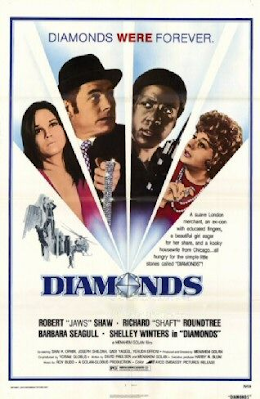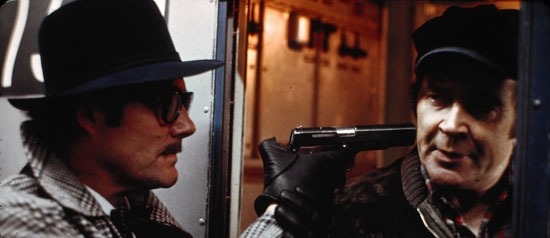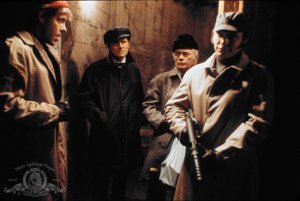We just finished our first of two screenings for Father's Day.
The time while people filed in was filled with a few trivia cards. Come on, you gotta find something a little harder than this.
Another Jaws List for you.
One of the myriad of things that Jaws is noted for are the quotes that have become part of the culture. The AFI has the most memorable quote from the film at number 35 on their list of 100 Greatest Quotes
That's a little low in my view but still respectable. Fans of the movie will have a dozen other quotes that they will harpoon you with if given a chance.
Bureaucrats everywhere will be comforted by the rationalization of the mayor of Amity when he warns the Chief about being too proactive based on the first attack.
Mayor Vaughn:
Martin, it's all psychological. You yell barracuda, everybody says,
"Huh? What?" You yell shark, we've got a panic on our hands on the
Fourth of July.
It's awful hard not to smile with righteous glee when the truth gets flung back in the face of the sheepish police chief and the cow-towing medical examiner by young Mr. Hooper on examining the body of the first victim.
Hooper:
Well, this is not a boat accident!
Of course the misanthropic shark hunter Quint has no shortage of million dollar lines.
At the town meeting, after he gets a introduction worthy of Errol Flynn in "The Adventures of Robin Hood", he sums up his offer to all the locals succinctly.
Quint: $10,000 for me by myself. For that you get the head, the tail, the whole damn thing.
As Quint engages in the male ritual of one upmanship with the Chief by offering a toast with his own home made moonshine, he shows himself to be as crude as the Chief fears he might be.
Quint:
Here's to swimmin' with bow-legged women.
Of course Quint also gets the whole monologue about the sinking of the U.S.S. Indianapolis. That five minutes has some of the greatest visualizations and quotes in it and star Robert Shaw delivered it perfectly.
Chief Brody has no shortage of good lines. One quote inspired Director Bryan Singer to name his
production company.
Brody:
That's some bad hat, Harry.
Perhaps the greatest ad-libbed line ever created, comes from actor Roy Scheider, when he first gets a look at their nemesis. He backs of in fear and awe and tells Quint everything he should know about what is going to happen.
Brody:
You're gonna need a bigger boat.

This post however, is a salute to some of the lesser lines in the film.
They often convey a character or render a bit of humor in the first half
of the movie. Screenwriter Carl Gottlieb, who appears in the film as the local newsman Meadows, was a TV writer who added punch to most of the script which had a spine from novelist Peter Benchley. He is almost certainly responsible for the quotes that follow, many of which are spoken in the background of the scene.
The Chief's Secretary is in only one scene but she quickly conveys to the audience how mundane the work of the police department in Amity should be. Her big piece of news is the complaint from some of the local businessmen.
"It seems that the nine year olds from the school have been karate-ing the picket fences."--Polly

The mayor says it in more than one spot, Amity is a summer town, it depends on summer dollars. When the Chief goes to the hardware store to get the materials for printing "Beaches Closed" signs, we hear in the background the local merchant complaining to the jobber who has failed to bring the requested summer product. You can tell from his language that he's an "Islander".
"This stuff isn't going to help me in August, the summer ginks come down here in June."--Store Owner

The Chief's Deputy conveys his sense of powerlessness, lack of status and personal insecurities when the Chief instructs him to let Polly do the printing on the signs. He demurs with an understated question.
"What's the matter with my printing?"--Hendricks
As the town selectmen announce support for closing the beaches, the Mayor tries to buy some calm with his pronouncement that the closure will only last 24 hours. The Chief says, "I never agreed to that", but from the crowd comes the fearful response.
"Twenty four hours is like three weeks."--Unidentified voice at the Council Meeting

The story is full of colorful characters who don't really get any development except their one or two scenes. When their attempt to catch the shark from a jetty on the opposite side of the island goes bad, you can hear the understatement of the year from the first guy out of the water:
"Charlie take my word for it, don't look back".--Denherder
Fisherman Ben Gardner has disdain for the outsiders showing up to collect the bounty put up by Mrs. Kitner on the shark. As he takes his charter out, he mutters a curse under his breath that sounds like it would come from the mouth of a local fisherman.
"Wait till we get them silly bastards down in that rockpile they'll be some fun, they'll wish their fathers had never met their mothers."--Ben Gardner
Matt Hooper attempts to be helpful by identifying the shark that is caught by one of the cast of idiots that went out on an overloaded launch. The quote itself is not so special, but the way in which it was delivered results in a laugh that is still hard to explain.
"A What?"--Belligerent Fisherman Pratt
Here is one that is so understated that I'm not sure I've ever heard it before. Amanda pointed it out to me when we were watching the film last Sunday. After Hooper offers his help in identifying the shark, he discovers that the know it all does not always endear himself to others. He made the mistake of suggesting that the shark might not be the one who killed the little boy. The bounty hunters take umbrage and offer to stick his head in the mouth of the shark to prove their point
"What I'm saying is it may not be the shark, just a slight difference in semantics that I don't want to get beaten up for."--Hooper
Obviously the lion's share of great lines went to the three stars. When the characters interact they reveal more about themselves to each other and us. As they are searching the waters where the shark has been feeding at night, Hooper chides the chief about being afraid of the water but living on an island. The Chief gives the only rationalization that makes sense of his situation:
"It's only an island if you look at it from the water".--Brody
The Mayor played by Murray Hamilton, is often seen as a villain in the story. In truth, he represents a part of the fear that the shark presents to the whole community. His way of coping is to cling to the trappings of his office and the illusion that some degree of control is still in his grasp. He's not as worried about the shark as he is about nascent Banksyies moving into the neighborhood.
"That is a deliberate mutilation of a public service message." --Mayor Vaughn
It is always funny to me when we show how predictable we are as humans. One of the prime examples of our craven natures is our desire to avoid responsibility for our actions. The world is full of excuse makers and apologists. Kids are much more honest about how this is true. When caught, one of the two kids with the cardboard fin is quick to sell out his buddy in order to weasel out of paying a penalty.
"He made me do it, he talked me into it."-- Whiny Prankster
OK, those are my choices. If you have some that you like and I neglected to mention, feel free to add them in your comments, then we will either take it under consideration or hang you up by your Buster Browns.




























.jpg)